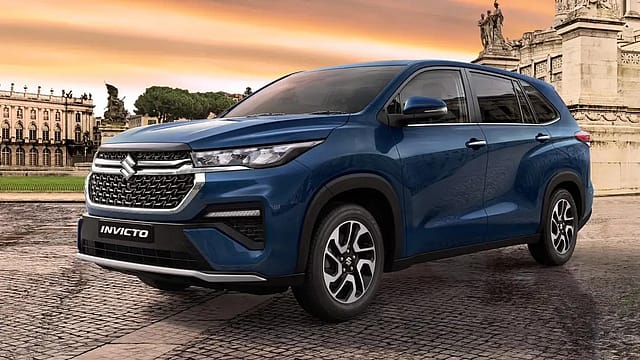Maruti Suzuki eyes premium UV market with Invicto
ADVERTISEMENT

India's largest carmaker Maruti Suzuki India Ltd is eyeing to corner a bigger share of the utility vehicle market with its hybrid three-row multi-purpose vehicle (MPV), the Invicto.
Invicto, which has already received 7,500 bookings, is the top model of Maruti's Nexa range and the eighth product in the lineup. Its launch comes at a time when the automaker's premium retail channel has completed 8 years.
Priced between ₹24.79 lakh and ₹28.42 lakh (ex-showroom), the Invicto, a badge-engineered version of Toyota's Innova Hycross, is the highest-priced offering in Maruti Suzuki's portfolio.
The Invicto, a self-charging strong hybrid vehicle, switches between pure electric, petrol mode and hybrid mode depending on the driving situation. For low-speed cruising, the energy stored in the battery pack — which gets charged through regenerative braking — is utilised to power the electric motor. When the electric motor kicks in, the overall load on the 2-litre petrol engine reduces, giving an extended range to the vehicle.
Maruti Suzuki expects 25% of its total sales to come from hybrid vehicles by 2030. The carmaker is counting on the Invicto, its second strong hybrid car after the Grand Vitara, to achieve this target.
"In the first quarter of FY24, around 16,900 hybrid cars were sold compared with 22,600 EVs," says Shashank Srivastava, senior executive officer, Marketing & Sales at Maruti Suzuki.
Around 40-50% of the time in cities, hybrid cars run on EV mode, offering higher fuel efficiency, says Srivastava. "The best part is you don't require charging infrastructure." Maruti Suzuki sold 3,800 hybrid units of Grand Vitara during the first quarter.
Hybrid vehicles are nearly matching the volume levels of EVs, Srivastava says, adding that this economic logic will decide consumer preference going forward.
India's biggest carmaker discontinued production of diesel vehicles ahead of the adoption of BS-VI emission norms in April 2020. In the entry-level SUV and mid-level SUV segments, the market share of diesel cars has dropped consistently over the years, says Srivastava. "As the emission norms get tighter, the money that is required for diesel vehicles to comply with the rules may make them even more expensive, which will not make economic sense."
Maruti Suzuki is eyeing the pole position in the SUV market. Its share in the segment has risen from 8.5% in Q1 FY23 to 20% in Q1 FY24. "Maruti's market share was not only impacted because of the non-availability of SUVs in the last few years but also due to the fact we stopped making diesel cars," says Srivastava. "Maruti operates in 82% of the passenger vehicle market. It has no presence in the 18% diesel market," he adds.
Maruti Suzuki currently has 3,62,000 pending bookings, which include XL6, Brezza, Vitara, Fronx, Jimny, and Dzire. "This is because of the semiconductor issue. By July onwards, we are hoping that we will make substantial improvements in the supply of these models. We hope to reduce the waiting period for these models," says Srivastava.
The launch of Invicto comes at a time when the contribution of cars costing over ₹10 lakh in Maruti Suzuki's portfolio has risen from 13% in FY16 to 40% in FY23.
In the first quarter of the ongoing fiscal, Maruti Suzuki's PV sales grew 12.2% year-on-year. "We are maintaining 5-7% growth in FY24 as the second quarter of FY23 was the record quarter in history. Considering this base, growth will be muted even if absolute volumes increase," says Srivastava.